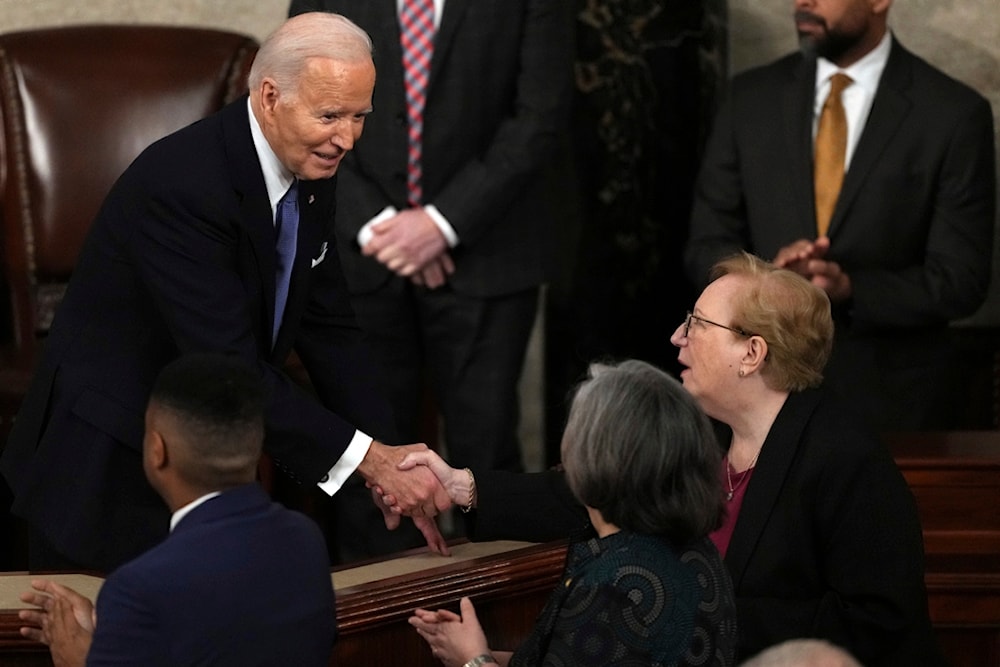Biden signs $459Bln spending bill amidst congressional challenges
US President Joe Biden signed a $459 billion spending bill aimed at preventing a partial government shutdown, marking progress in funding critical areas, though concerns linger over allocation and upcoming negotiations for a larger funding package.
-

President Joe Biden shakes hands after he delivered the State of the Union address to a joint session of Congress at the U.S. Capitol, Thursday, March 7, 2024, in Washington (AP Photo/Andrew Harnik)
US President Joe Biden on Saturday signed a $459 billion spending bill aimed at thwarting a partial government shutdown, Politico reports.
The Senate on Friday passed the measure 75-22, following a series of failed Republican amendments that failed on the floor.
According to the report, this funding will support critical areas such as transportation, energy, housing, agriculture, veterans programs, and military construction projects. Additionally, the package includes allocations for departments such as Commerce, Interior, and Justice, as well as funding for the Environmental Protection Agency, the Food and Drug Administration, and various science and water programs.
Big win for Democrats
Despite delays caused by infighting among House Republicans, the passage of this package marks the first progress in funding the US government, which had been delayed for more than five months into the fiscal year.
Looking ahead, Congress now faces a looming deadline of March 22 to finalize another, larger funding package. This package will cover approximately 70 percent of the government's budget, including vital sectors such as the military, health, education, and labor programs.
Read more: US Congress allocates $7.1Bln to renew Pacific military presence
Congressional appropriators and leaders are expected to focus their efforts on completing negotiations and reaching agreements on this second spending bundle before the deadline.
Despite the challenges, there is optimism among congressional leaders that the remaining funding bills can be finalized before the deadline. But certain measures, such as those related to funding for the Department of Homeland Security or major health, labor, and education programs, may present particular obstacles.
Pressure on the Speaker
Throughout these negotiations, Speaker Mike Johnson has faced pressure to secure wins for conservatives while grappling with limited leverage against a Democratic-controlled Senate and White House. Despite criticisms from some within his party over perceived shortcomings in spending cuts and policy wins, there is little indication of significant opposition to his leadership.
The funding package passed by the Senate adheres to spending limits established under previous agreements, namely those set under the debt limit agreement President Joe Biden struck with then-House Minority Leader Kevin McCarthy last summer.
Read more: Corruption scandal in Ukraine sparks outrage in US Congress
These agreements aimed to maintain non-defense funding levels relatively unchanged, resulting in most federal agencies and programs covered in the six-bill package receiving only minor adjustments to their budgets through September.
Thus, according to the report, the package ensures a level of stability in federal funding through the end of September.
However, some lawmakers express concerns about the allocation of funds, particularly regarding critical programs.
Concerns over limited funds
Senator Chris Coons from Delaware expressed disappointment over the allocated funding levels, particularly for the bill he oversees, which funds the State Department and foreign operations.
"Overall, we did not set — in my view — spending levels at the right level," he said.
Despite recognizing critical investments in important areas, Coons noted that some organizations will not receive adequate funding and that the spending limits led to difficult decisions and unfortunate consequences, noting that the allocated amounts may not be sufficient to meet the needs of various programs and initiatives.
Read more: Zelensky pleads for more US aid, amid Republicans' floundering support

 3 Min Read
3 Min Read








